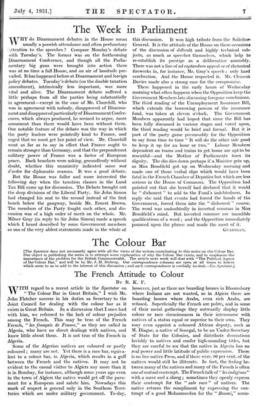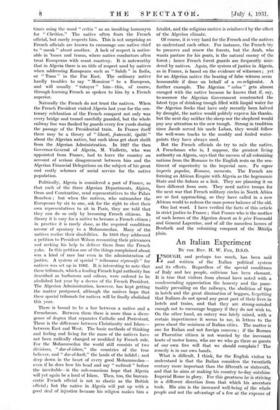The Colour Bar
[The Spectator does not necessarily agree with all the views of the writers contributing to this series on the Colour Bar. Our object in publishing the series is to attempt some explanation of why the Colour Bar exists, and to emphasize the importance of the problem for the British Commonwealth. The article next week will deal with "The Political Aspect of the Colour Bar," and will be by Mr. J. H. Driberg. Our correspondence columns are open at all times to letters which seem to us to add to the interest of this discussion ; and such correspondence is cordially invited.—En.Spectator.1
The French Attitude to Colour
By B. K. F.
-WITH regard to a recent article in the Spectator on "The Colour Bar in Great Britain," I wish Mr. John Fletcher success in his duties as Secretary to the Joint Council for dealing with the colour bar as it exists in Great Britain. In a discussion that I once had with him, we referred to the lack of colour prejudice among the French. This may be true of the French French, "leg francais de France," as they are called in Algeria, who have no direct dealings with natives, and know little about them. It is not true of the French in Algeria.
Some of the Algerian natives are coloured or partly coloured ; many are not. Yet there is a race bar, equiva- lent to a colour bar, in Algeria, which results in a gulf between the French and the natives. It may not be evident to the casual visitor to Algiers any more than it is in Bombay, for instance, although some years ago even in the town' of Algiers the native Would get off the pave- nient for a European and salute him. 'Nowadays this mark of respect is general only in the Southern Terri- tories which are under military government. To-day, however, just as there are boarding houses in Bloomsbury where Indians are not wanted, so in Algiers there are boarding houses where Arabs, even rich Arabs, are refused. Superficially the French are polite, and in some of their social gatherings they outwardly display little colour -or race Consciousness in their intercourse with natives of a status equal or superior to their own. They may even appoint a coloured African deputy, such as M. Diagne, a native of Senegal, to be an Under-Secretary of State for the Colonies, and distribute decorations lavishly to natives and confer high-sounding titles, but they are careful to see that the native in Algeria has no real power and little latitude of public expression. There is no free native Press, and if there were, 90 per cent, of the natives would still be illiterate. In fact, the feeling be- tween many of the natives and many of the French is often one of mutual contempt. The French talk of" les indiggnes" with a sneer and a shrug ; sometimes they openly express their contempt for the "sale race" of natives: The native returns the compliment by expressing the con- tempt of a good Mohammedan for the " Roumi," some- times using the word " cretin " as an insulting homonym for " Chretien." The native often fears the French official, but rarely respects him. This is not surprising as French officials are known to encourage one native chief to " sneak " about another. A lack of respect is notice- able in 'buses and trams, where native ,conductors often treat Europeans with scant, courtesy. It is noteworthy that in Algeria there is no title of respect used by natives when addressing Europeans such as " Sahib " in India, or " Tuan " in the Far East. The ordinary native hardly troubles to say " Monsieur " to a European, and will usually " tutoyer " him—this, of . course, through learning French as spoken to him by a French superior.
Naturally the French do not trust the natives. When the French President visited Algeria last year for the cen- tenary celebration of the French conquest not only was every bridge and tunnel carefully guarded, but the whole railway line was flanked by guards every few yards during the passage of the Presidential train. In France itself there may be a theory of " liberte, fraternite, egalite" about the Algerian native, but such ideas get short shrift from the Algerian Administration. In 1927 the then Governor-General of Algeria, M. Viollette, who was appointed from France, had to leave the country on account of serious disagreement between him and the Algerian Financial Delegations on the subject of his great and costly schemes of social service for the native population.
Politically, Algeria is considered a part of France, so that each of the three Algerian Departments, Algiers, Oran and Constantine, send representatives to the Palais Bourbon ; but when the natives, who outnumber the Europeans by six to one, ask for the right to elect their own representatives to sit in Paris, they are told that they can do so only by becoming French citizens. In theory it is easy for a native to become a French citizen ; in practice it is rarely done, as the required conditions savour of apostasy to a Mohammedan. Many of the natives realize their disabilities. In 1919 they addressed a petition to President Wilson recounting their grievances and seeking his help to deliver them from the French yoke. In this petition one of the things complained about was a kind of race bar even in the administration of • justice. A system of special " tribunaux repressifs " for natives was set up in 1902. It is interesting to note that these tribunals, which a leading French legal authority has described as barbarous and odious, were ordered to be abolished last year by a decree of the French President. The Algerian Administration, however, has kept getting the matter postponed, although the natives hope that these special tribunals for natives will be finally abolished this year.
There is bound to be a bar between a native and a Frenchman. Between them there is more than a diver- gence of dogma that separates Catholic and Protestant. There is the difference between Christianity and Islam— between East and West. The basic methods of thinking and feeling and living for the mass of the natives have not been radically changed or modified by French rule. For the Mohammedan the world still consists of two divisions, " dar-el-islam," the countries of the true believer, and " dar-el-harb," the lands of the infidel ; and deep down in the heart of every good Mohammedan-- even if he does bow his head and say " mektoub " before the inevitable—is the sub-conscious hope that Algeria will yet again be a land of Islam. Then, too, the bureau- cratic French official is not so elastic as the British official ; but the native in Algeria will put up with a good deal of injustice because his religion makes him a fatalist, and the religious motive is reinforced by the effect of the Algerian climate.
Of course, it is very hard for the French and the natives to understand each other. For instance, the French try to preserve and renew the forests, but the Arab, who wants pasture for his goats, is the natural enemy of the forest ; hence French forest guards are frequently unix.- dered by natives. Again, the system of justice in Algeria, as in France, is based on the evidence of witnesses ; , yet for an Algerian native the bearing of false witness seem honourable if done on behalf of a co-religionist. A further, example. The Algerian " colon " gets almost enraged with the native because he knows that if, say, to-morrow the Algerian Government constructed the latest type of drinking trough filled with limpid water for the Algerian flocks that have only recently been halved by drought, the native would politely express his thanks, but the next day neither the sheep nor the shepherd would pay any attention to the new trough. Strong in tradition since Jacob served his uncle Laban, they would follow the well-worn tracks to the muddy and fouled water- points they have always used.
But the French officials do try to rule _ the native. A Frenchman who is, I suppose, the greatest living authority on Algeria, says that the success of all colonizing nations from the Romans to the English rests on the sen- timent of superiority in the imperial race. Tu. regere imperio populos, Romane, memento. The French are forming an African Empire with Algeria as the hegemonic State and the Sahara as a link. They are planning it on lines different from ours. They need native troops for the next war that French military circles in North Africa see so fast approaching, so they have called in a new African world to redress the man-power balance of the old.
One last word. I have verified the facts of this article in strict justice to France ; that France who is the mother of such heroes of the Algerian desert as is pare Foucauld and General Laperrine, and of all the nameless 'heroes of Boufarik and the colonizing conquest of the Mitidja plain.











































 Previous page
Previous page